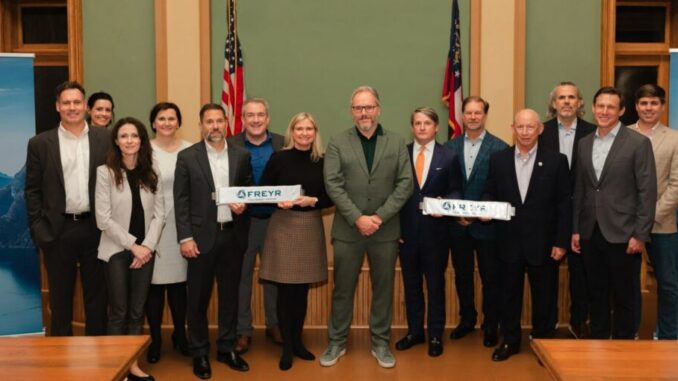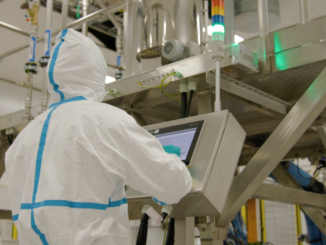
ENB Pub Note: Stu Turley, ENB Host was able to interview Tom Jensen, CEO, FREYR Battery, on the ENB Podcast released on November 3, 2022. You can check out the entire interview HERE.
Lithium-ion gigafactory company FREYR Battery has chosen the state of Georgia for its planned US production facility amidst reports it is in talks to raise US$500 million from private equity firm KKR.
The Norway-based company has selected and purchased a 368-acre site at the Bridgeport Industrial Park in Coweta County, Georgia, for its multi-phase US gigafactory project, ‘Giga America’.
The factory will open in phases with an initial battery cell production module with 34GWh of annual capacity, requiring a preliminary US$1.7 billion of investment.
FREYR Battery said that “strong tailwinds” in US clean energy market dynamics, including the Inflation Reduction Act, have brought the company to accelerate its expansion plans there.
Meanwhile, Bloomberg has reported that the company, which listed on the NYSE through a SPAC merger in mid-2021 late last year, is in talks with private equity firm KKR to raise US$500 million. KKR is one of the largest private equity firms in the world and often described as one of the first too.
FREYR declined to comment when asked by Energy-Storage.news, while Bloomberg’s report added that the financing discussions could be disclosed as soon as this week.
FREYR will now undertake detailed plant engineering, finalising the module plans and evaluating evaluating additional ‘value accretive’ upstream and downstream modules as well as a second cell production phase. A second cell production phase would bring the investment total to US$2.6 billion by 2029.
It said that the State of Georgia and Coweta County are collectively providing strong financial incentives for the project and that the development of the US gigafactory positions the firm to meet the rapidly growing demand for energy storage systems (ESS) applications with US-based offtake partners. CEO Tom Jensen told Energy-Storage.news earlier this year that, at the group-level, at least half of its capacity could go the ESS sector (since which it has more than doubled its capacity target).
FREYR co-founder and CEO Tom Jensen commented: “Today’s landmark announcement underscores FREYR’s ambition to develop a very strong and near-term operational footprint in the United States.”
“Expanding into the US has been a foundational aspect of FREYR’s long-term strategy from our inception, and with the recent passage of the Inflation Reduction Act, we expect US demand for ESS, passenger EV and other electric mobility applications to grow rapidly over the next decade.”
The firm is targeting an annual production capacity across the Nordics and the US of 200GWh by 2030. It is accelerating its US plans based on strong tailwinds including growing renewable energy deployments, grid stability initiatives and tax incentives associated with the Inflation Reduction Act, it said.
It added that it is evaluating clean power supply solutions for Giga America with utility providers in the region, including developing a dedicated solar-plus-storage facility. Its Norwegian gigafactories will be powered by hydropower facilities, which account for nearly all electricity generation in the Nordic country.
Giga America’s production will be based on the proprietary lithium-ion battery production technology from 24M, a spinout from MIT, as for its Nordic facilities which are set to start production in early 2024 (slightly later than first announced when the company was raising funds from the capital markets before listing).
It hasn’t revealed whether the US facility will produce nickel manganese cobalt (NMC) batteries or lithium iron phosphate (LFP) ones, with the first Nordic facility producing the latter.
Read previous Energy-Storage.news coverage of FREYR here, including the firm recently upsizing its battery agreement with system integrator Nidec ASI to 50GWh, appointing a US head of operations and establishing a technology campus in Japan to explore new technology partnerships.

